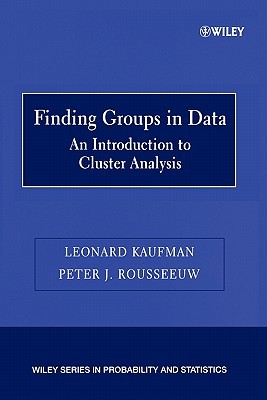
- We will send in 10–14 business days.
- Author: Kaufman
- Publisher: John Wiley & Sons
- ISBN-10: 0471735787
- ISBN-13: 9780471735786
- Format: 16 x 23.4 x 1.7 cm, softcover
- Language: English
- SAVE -10% with code: EXTRA
Reviews
Description
The Wiley-Interscience Paperback Series consists of selected books that have been made more accessible to consumers in an effort to increase global appeal and general circulation. With these new unabridged softcover volumes, Wiley hopes to extend the lives of these works by making them available to future generations of statisticians, mathematicians, and scientists.
"Cluster analysis is the increasingly important and practical subject of finding groupings in data. The authors set out to write a book for the user who does not necessarily have an extensive background in mathematics. They succeed very well."
--Mathematical Reviews
"Finding Groups in Data [is] a clear, readable, and interesting presentation of a small number of clustering methods. In addition, the book introduced some interesting innovations of applied value to clustering literature."
--Journal of Classification
"This is a very good, easy-to-read, and practical book. It has many nice features and is highly recommended for students and practitioners in various fields of study."
--Technometrics
An introduction to the practical application of cluster analysis, this text presents a selection of methods that together can deal with most applications. These methods are chosen for their robustness, consistency, and general applicability. This book discusses various types of data, including interval-scaled and binary variables as well as similarity data, and explains how these can be transformed prior to clustering.
EXTRA 10 % discount with code: EXTRA
The promotion ends in 19d.23:33:18
The discount code is valid when purchasing from 10 €. Discounts do not stack.
- Author: Kaufman
- Publisher: John Wiley & Sons
- ISBN-10: 0471735787
- ISBN-13: 9780471735786
- Format: 16 x 23.4 x 1.7 cm, softcover
- Language: English English
The Wiley-Interscience Paperback Series consists of selected books that have been made more accessible to consumers in an effort to increase global appeal and general circulation. With these new unabridged softcover volumes, Wiley hopes to extend the lives of these works by making them available to future generations of statisticians, mathematicians, and scientists.
"Cluster analysis is the increasingly important and practical subject of finding groupings in data. The authors set out to write a book for the user who does not necessarily have an extensive background in mathematics. They succeed very well."
--Mathematical Reviews
"Finding Groups in Data [is] a clear, readable, and interesting presentation of a small number of clustering methods. In addition, the book introduced some interesting innovations of applied value to clustering literature."
--Journal of Classification
"This is a very good, easy-to-read, and practical book. It has many nice features and is highly recommended for students and practitioners in various fields of study."
--Technometrics
An introduction to the practical application of cluster analysis, this text presents a selection of methods that together can deal with most applications. These methods are chosen for their robustness, consistency, and general applicability. This book discusses various types of data, including interval-scaled and binary variables as well as similarity data, and explains how these can be transformed prior to clustering.


Reviews